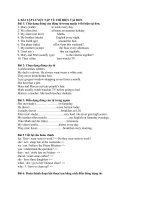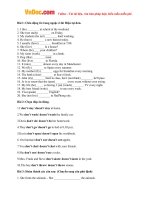bai tap thi hien tai don cho lop 6
Bạn đang xem bản rút gọn của tài liệu. Xem và tải ngay bản đầy đủ của tài liệu tại đây (90.34 KB, 10 trang )
Simple Present
1. Formation
Affirmative Statements Negative Statements
I
You
(*)
We
They
Plural nouns
V
bare inf
I
You
(*)
We
They
Plural nouns
do not
(don’t)
V
bare inf
He
She
It
Proper name
Nouns
sing / unC
V
-s/es
He
She
It
Proper name
Nouns
sing / unC
does not
(doesn’t)
V
bare inf
*You is both
singular
and
plural
•
I walk to school
.
•
She likes strawberries
.
•
I do not (don’t) walk to school
.
•
She does not (doesn’t) like
strawberries
.
(For spelling rules for the Present Simple, see appendix 7 on page xxvii.
For pronunciation rules for the Present Simple, see appendix 11 on page
xxx.)
Yes/No Questions WH-Questions
Do
I
you
(*)
we
they
Plural nouns
V
bare inf
?
What
Where
When
What time
do
I
you
(*)
we
they
plural nouns
Does
he
she
it
Proper name
Nouns
sing / unC
does
he
she
it
proper name
nouns
sing / unC
•
Do you walk to school? Yes
,
I do
.
•
Does she like strawberries?
No
,
she doesn’t
.
•
What does she like?
•
She likes mangoes
.
Wh-Questions About The Subject
Who
V
-s/es
Complement ?
What
87
29
Grammar Time Nguyen Tri Tuan – Nguyen Tuan Kiet
Who buys new cars? Anna’s brothers (do)
.
What costs a lot? Anna’s car (does)
.
Usage
We Use the Simple Present Example
1. to express a general truth.
•
The English are reserved
and cold
.
•
Vietnam doesn’t export
automobiles
.
•
The earth revolves around
the sun
.
2. to express a present habit or routine.
•
My father always goes to
work by bus
.
•
He doesn’t drink coffee
.
•
She and I go to the cinema
once a week
.
3. for a present situation (not temporary). •
He lives in the United
States
.
4. for a scheduled future event
(timetables, programs, schedules)
Verbs such as “start,
begin,
leave
and
end” are often used in this way.
•
The press conference
begins at 8
:
30 A
.
M
.
•
Our meeting ends promptly
at 4
:
30 P
.
M
.
5. always with stative verbs.
• verbs of the senses
• verbs of opinion and
understanding
• verbs of emotions and
feelings
• in the first conditional
•
Do you hear anything?
•
He doesn't understand
Japanese
.
•
She hates classical music
.
•
He will come to the party if
you invite him
.
NOTES:
i) Adverbs of frequency are often used in the simple present:
“always, usually,
often, sometimes, occasionally, rarely, seldom, never, once / twice a
week…”
My aunt never eats meat
.
Kate Winslet usually wears a pair of size 11 shoes
.
ii) The following adverbs are placed either at the beginning or at the end of a
sentence:
88
Nguyen Tri Tuan – Nguyen Tuan Kiet Chapter 5
“sometimes, every day, every week, every year, occasionally”
Every day his grandfather eats meatless meals
.
EXERCISE 1
Put the verbs in parentheses into the correct form.
1. The swimming pool ______________
(open)
at 9:00 and ______________
(close)
at 6:30 every day.
2. What time ______________
(the banks / close)
here?
3. I have a car, but I ______________
(not / use)
it very often.
4. How many cigarettes ______________ (
you
/
smoke
) a day?
5. "What ______________
(you/do)
?" "I'm an electrical engineer.”
6. "Where ______________
(your father / come)
from?" "He ______________
(
come
) from Mexico.”
7. It ______________
(take)
me an hour to get to work. How long
______________
(it / take)
you?
8. I ______________
(play)
the piano, but I ______________
(not / play)
very
well.
9. I don't understand the word "deceive". What ______________
("deceive" /
mean)?
EXERCISE 2
Complete the sentences. Use the correct form of the verbs in parentheses.
Al Brown ___
teaches__
(1.
teach
) English as a second language. He is unlike the
other teachers in his department. He is only twenty-seven years old. The other
teachers are over thirty. The other teachers _____________ (2.
wear
) button-down
shirts. Al _____________ (3.
wear
) T-shirts or sweatshirts. After class the other
teachers ______________ (4.
go
) home. Every afternoon Al _____________ (5.
go
)
to the park. Many students _____________ (6.
play
) soccer in the park. Sometimes Al
______________ (7.
watch
) his students, and sometimes he _____________ (8.
play
) soccer with them.
Three evenings a week Al _____________ (9.
have
) Japanese lessons with a private
tutor. His tutor is one of his students. Every evening Al _____________ (10.
study
)
Japanese at the library and _____________ (11.
do
) Japanese homework.
Al’s girlfriend is in Japan. Al _____________ (12.
miss
) her a lot. He _____________
(13.
worry
) about her, too. He _____________ (14.
hope
) to see her in the summer.
EXERCISE 3
Use these sentences to make questions. Begin your questions with the
word(s) in parentheses.
Examples: Tom plays tennis. (How often?)
How often does Tom play tennis?
I jog in the morning. (What time / usually?)
What time do you usually jog?
1. Ann watches television.
89
Grammar Time Nguyen Tri Tuan – Nguyen Tuan Kiet
(How often?)
_____________________________________________________?
2. I write to my parents.
(How often?)
_____________________________________________________?
3. I have dinner in the evening.
(What time / usually?)
_____________________________________________?
4. Tom works.
(Where?)
_______________________________________________________?
5. I go to the movies.
(How often?)
_____________________________________________________?
6. People do stupid things.
(Why?)
_________________________________________________________?
7. The car breaks down.
(How often?)
____________________________________________________?
EXERCISE 4
Find and correct the mistakes in this story about Doug.
My name is Doug Winston. I’m in my second year of high school. I’m the captain of
my school’s soccer team. I lives
live
in New York City with my parents. We lives in a
large apartment in an old building. Both my mother and father works. My mother is a
writer. She write stories for magazines. My father is a businessman. His work take
him all over the world. I has two older sisters, Carol and Norma. Carol live in Oregon
and Norma live in Massachusetts. I no have any brothers. Carol’s a student at Oregon
State University and Norma’s a Spanish teacher in a high school in Boston. Norma’s a
good Spanish teacher, but I’m glad she no is my teacher. She gives her students a lot
of homework.
Present Continuous
1. Formation
S + Am / Is / Are + V
ING
+ …
Affirmative
•
I am reading now
.
•
The bees are humming
.
Negative
•
My students aren’t taking the midterm test
.
•
He isn’t taking a shower
.
Interrogative
•
What are you doing? I am tying up my shoelaces
.
•
Is she leaving for Japan tomorrow? Yes
,
she is/ (No
,
she isn’t
.
)
(See appendix 6 on page xxvi.)
2. Usage
We use the Present Continuous to
express
Example
90
30
Nguyen Tri Tuan – Nguyen Tuan Kiet Chapter 5
1. a continuous action at the moment of
speaking.
•
My students are writing now
.
•
They are talking noisily at the
moment
.
2. an action that is happening in the
extended time (e.g., nowadays,
this month, this semester, this
year, etc.),
even if it’s not occurring
at the moment of speaking.
•
He is preparing for the final test
this week
.
•
She is studying computer
programming this semester
.
3. a planned action in the near future.
•
She is flying to Japan tomorrow
.
•
Are you paying for dinner next
time?
4. a gradual change.
•
It is getting colder and colder
.
•
The test’s difficulty is increasing
.
5. a present and temporary activity.
•
She is smoking a lot
.
(She doesn’t normally smoke.)
6. a repeated action that irritates the
speaker (with always, constantly,
continually, repeatedly, forever).
•
The boy is always asking me for
candies
.
•
He is continually telling other
people what to do
.
NOTES:
i) Non-action verbs are not normally used in the continuous tense. (
See
Appendix 2 on page xxiii for a list of non-action verbs.
)
ii) Some non-action verbs can be used in the Present Continuous tense
when they have another meaning, as in the following examples:
Non-action Verbs Other meanings
•
Are
you hungry?
•
You are being foolish
.
You know?
(be = act)
•
I think you’re right
. (think = believe) •
I’m thinking about this grammar
.
(think about= consider)
•
He has a car
. (have = own) •
He is having a good time
.
(have = spend)
•
This soup tastes delicious
.
(taste = have a particular flavor)
•
My mother is tasting the sauce
she’s made
. (taste = eat)
•
This room smells a little damp
.
(smell = have a particular smell)
•
Sashay is smelling the sweet
aroma of warm chocolate
.
(smell =
notice)
•
He sees the scene clearing now
.
(see = catch sight of)
•
He is seeing the zoo
.
( see = visit)
•
You look about twenty
.
(look = have a particular appearance)
•
Sheila is looking at herself in the
mirror
.
(look = direct one’s eyes)
•
My present job appears not easy at all
. •
The most famous singer is
91









